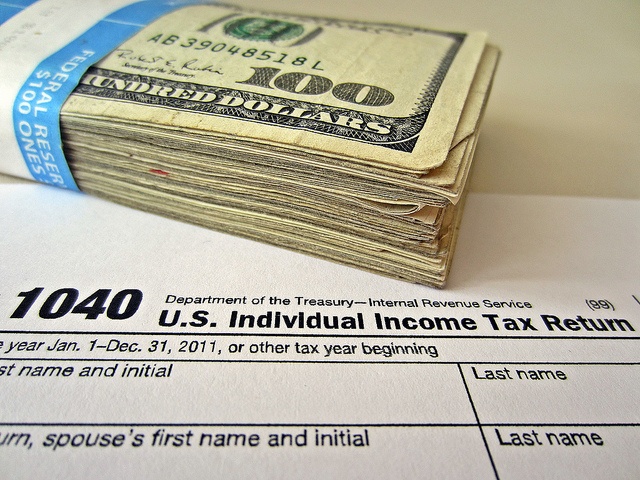Every year, the Internal Revenue Service sets a standard rate each mile driven for work is worth. While tracking and reporting these miles can be a headache for business owners and employees, it is vital to your tax return. In some cases, incorrect mileage reporting can lead to audits. Understanding the current rates and rules of mileage reporting, as well as the digital apps available to help you track these miles will set you and your business up for success.
It's tax season and it seems like there's a million other things you could be doing other than figuring out your taxes. But you might want to set aside some time to look at your individual tax return because you could be overlooking some important tax deductions that could help you save money every year! Here are just some of the most frequently overlooked deductions!
Tags: Tax Return, Tax, Tax Deductions
2017 Return – Your Last Chance to Claim the Personal Exemption
It’s Tax Time!
Tax season is officially here. Whether you’re self-employed, a W-2 employee, single or married, your 2017 return is your last chance (for at least 8 years) to claim certain tax deductions. It’s important to make sure you’re accounting for any applicable deductions in order to lower your tax bill or possibly enhance your refund.
This multi-part blog series will cover five deductions that were either eliminated or changed as a result of the new tax law. Stay tuned to ensure you are claiming the appropriate deductions and know what to expect in the years to come!
Tags: Tax Return, Tax, Tax Deductions
A levy is one of the harshest collection mechanisms used by the IRS and it’s a legal seizure of a taxpayer’s assets to satisfy back taxes owed. The IRS has the ability to seize your property (income, assets, funds) when they levy you. There are different types of levies that taxpayers can face depending upon the situation they are in. The IRS typically uses the method they think will be the easiest for them to receive the money that is owed. You will get notices from the IRS before you get levied and you will receive a Final Notice before the IRS levies your money. Here are the most common types of levies taxpayers can face.
What Is A Penalty Abatement and How Do I Get One?
If you owe taxes to the IRS, chances are you also have some penalties and interest attached to that tax debt. The IRS can penalize taxpayers for things like failure-to-file or failure-to-pay. Those penalties sit on top of your tax debt and can accumulate more interest and increase the taxes you owe. The IRS fortunately allows a first-time abatement for qualifying taxpayers. Most taxpayers don’t know about the first-time abatement (FTA) penalty wavier or how it can help them lower their tax debt.
How to Avoid Having Your Identity Stolen During Tax Season
Around this time of year taxpayers can get anxious about the threat of identity theft especially when it comes to tax fraud. We receive questions regarding how you can protect your data and personal information, and we hear a lot of unrealistic and exaggerated advice that is only confusing taxpayers and spreading fear. Here are five points we believe will help taxpayers protect themselves and their financial information:
What Is An Offer In Compromise & How Do You Qualify For It?
For some taxpayers, their tax debt is way more than they could ever afford to pay back. This is common for many people who have a very high profit year, don’t pay their taxes and then later when they are dealing with the tax problem, they don’t have as much money as they did before. An IRS Offer in Compromise (OIC) allows you to settle your tax debt for less than the full amount you owe. It is an agreement made between a taxpayer and the IRS to settle a tax debt for a certain amount of money. Offers are hard to qualify for and if the IRS believes you can pay back the taxes in full, they may reject any offer proposal you make. An offer is something to consider if you can’t pay the full tax liability or it would create a financial hardship for you if you tried. The IRS will look at your ability to pay, income, expenses, and asset equity to choose a plan based on what they can expect to collect in a reasonable period of time. There is a lot of misconceptions on the internet about OICs and how you can qualify so it’s important to make sure you understand what an OIC is and if you would need it.
How To Avoid Losing Your Passport Due to Unpaid Tax Debts
Imagine you’re getting ready for your summer vacation, you’ve got your bags packed and ready to go, and then you find out the IRS has suspended your passport. Your first thought could be if the IRS can even do that? The answer is yes. It’s the IRS’s new way to encourage taxpayers who are behind on their taxes, to pay what they owe. The IRS has begun to suspend passports for any taxpayer who owes a certain amount in taxes.
This month’s closed case round up includes a technician who withdrew from his retirement account too early and ended up owing a large tax debt, a client who waited four years for another tax attorney to solve their tax debt and ending up owing more, and a retiree who hadn’t filed his tax returns since 1990.
What is the Earned Income Tax Credit And How Do You Qualify For It?
Around tax season, it seems like there’s a million different tax credits and you aren’t always sure which ones will work best for you. One of the tax credits that is available to a lot of people, but most people don’t know about is the Earned Income Tax Credit (EITC).The Earned Income Tax Credit is a tax benefit for people working with a low to moderate income. The EITC is one of the biggest refundable credits, because it can create a tax refund for you if you weren’t sure you’d get one. Many people don’t claim the EITC even though they qualify for it because they think they are either ineligible, didn’t know about the credit, don’t think they made enough money to qualify, or are worried about paying for tax preparation services.











